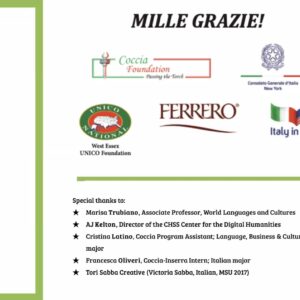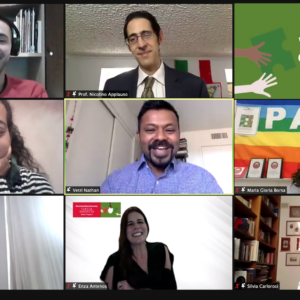In its 13th year, the annual Teaching Italian Symposium at Montclair State University, held virtually via Zoom on Oct. 23 and Oct. 24, was a testament to the commitment of the Joseph and Elda Coccia Institute for the Italian Experience in America and the Italian Program in the Department of World Languages and Cultures that they uphold to the professional development of teachers. Adapting to these unprecedented times, this year’s signature program, Equity in the Italian Curriculum, responded to recent and ongoing violence against Black people and people of color in the United States, and the disproportionate burdens placed on minorities by the current health crisis, and called educators to action for social justice. Because of the complex histories of Italy and Italian American’s, it is suiting to teach about social justice in the Italian language classroom.

The Teaching Italian Symposium serves as the tri-state area’s leading professional development conference for Italian teachers that instruct beginners to advanced university-level classes. Greetings from the new Director of the Coccia Institute, Mark Rotella, opened the program on Friday afternoon, welcoming the more than 160 participants: “As the new director of the Joseph and Elda Coccia Institute for the Italian Experience in America at Montclair State University, I’m thrilled that my inaugural event was the annual Teaching Italian Symposium.. While we aren’t able to greet old colleagues and meet new ones, we are part of a larger gathering that spanned across time zones, from the west coast of California, all the way to Italy.”
Following the Director’s address, Peter Kingstone, Dean of the College of Humanities and Social Sciences at Montclair State University, commented on the importance of holding this event virtually given the restrictions of in-person gatherings due to the pandemic: “This is critical as people who teach foreign languages can also be considered frontline workers in the effort to build an inclusive form of internationalization, which is ultimately based on understanding.”
Consul General of Italy Francesco Genuardi offered his gratitude to the organizers and participants of this annual event and reiterated that the Consulate of Italy in New York values the strategic effort to unite people through the Italian language, especially during these times, noting: “It is very important because it’s a way to react, to move forward, and to strengthen the identity of Italian Americans and of Italians here in the United States, and you always do so in very innovative and contemporary ways. At Montclair State University, you were able to associate the great and cool things about learning Italian through the dynamism of the Italian Made in Italy brands such as Ferrero. You also have the support of The Consulate General of Italy and we are very proud of what you are doing over these two days.”
The primary focus of Friday afternoon’s program revolved around “Voci Unite/Unifying Voices,” a lively discussion panel moderated by Dr. Enza Antenos, Symposium Chair, and featuring eight panelists — Amir Issaa (Artist), Nicolino Applauso (Morgan State University; Loyola University, Maryland), Maria Gloria Borsa (Bellaire High School), Kwanza Musi Dos Santos (Questaèroma), Silvia Carlorosi (Bronx Community College), Giulia Guarnieri (Bronx Community College), Rosetta Giuliani Caponetto (Auburn University), and Vetri Nathan (University of Massachusetts).
“An unexpected outcome of the pandemic has been to bring about a new momentum to Black Lives Matter, which inspired this year’s symposium,” said Dr. Antenos.”I believe the visceral experience we had to the death of George Floyd has inspired us to address long overdue issues of racism in our education system.”
The panel touched upon questions about being anti-racist and an ally as educators. It brought about a reflection as to what all of us could do to contribute to the movement and to enforce social justice and equity in language classrooms.
Amir Issaa commented, “In Italy, people still think that a black person came from Africa. One does not imagine that maybe they were born in Italy. Therefore I say that in Italy, we have a lot of work to do regarding this factor. To make people understand that Italian aesthetics today could be like mine, like Kwanza’s, like Vetri Nathan’s, like many others’. And we are Italian, one hundred percent, cento per cento.”
Nicolino Applauso recounted his own experience with prejudice growing up in Italy. Applauso’s father was the only Meridionale, or Southern Italian, in their small town. His mother was Italian-American, born and raised in New York, and was never considered “a true Italian.” Throughout his life, Applauso and his family would hear degrading remarks “go back to Africa” and “go back to the United States.”
Maria Gloria Borsa contributed to the conversation with another perspective: she wanted to show her students a different Italy that she knew in her youth, one that was already diversified with other cultures instead of the typical stereotype of the pure white Italian: “My Italy is not composed of white people with brown hair or blue eyes and blond hair. Italy was already beginning to change substantially. Italy had already changed ten years before.”

The first day of the event wrapped up with the conferment of the Coccia-Inserra Award for Excellence and Innovation in the Teaching of Italian (K-12), which was awarded to Maria Gloria Borsa of Houston, TX. The award was presented to Borsa by Andrea Baldi, judge committee chair and chair of the the Italian Department at Rutgers University, with words of congratulations by Elisa Coccia, President of the Coccia Foundation, Lindsey Inserra, daughter of Lawrence Inserra Jr., and Dominic Caruso, Honorary Consul General of Italy in New Jersey.
The second day began with a welcome from Professor Mark Rotella, the Director of the Education Office at the Consulate General of Italy in New York, Annavaleria Guazzieri, and Montclair’s own Dr. Marisa Trubiano, Associate Professor of Italian, who provided yet another compelling reason to study Italian: “Italy continues to be of great relevance and opportunities, with its history of colonialism and Italian emigration in the world.” Yet, students should also explore Italy in contemporary contexts. She adds: “The new immigration in Italy inevitably leads us to consider the fluidity of identity at all levels, the arbitrariness of color lines and boundaries of acceptance, and to abandon outdated symbols and approaches, to embrace new ones. ”
To help inform and contemporize the Italian curriculum at their schools, attendees participated in interactive workshops facilitated by the panelists: Nicolino Applauso’s Can You Turn it Into a Movie?; Silvia Carlorosi and Giulia Guarnieri’s Implementing Critical Thinking and Inclusion with Low Stake Writing; Maria Gloria Borsa and Kwanza Musi Dos Santos’s Black Italy; Rosetta Giuliani Caponetto and Vetri Nathan’s Teaching Social Justice Through Italian Food Studies; and Amir Issaa’s Vivo per questo – potere alle parole. These experts transformed lesson plans by using a myriad of pedagogically sound strategies and techniques that integrate social justice, awareness and inclusion from primary school levels to higher education classrooms.
The day concluded with a music video presentation of “Non respiro” the Italian song by rap artist Issaa who also spoke on his book on his memoir, Vivo per questo.
The Symposium received positive feedback from its participants. A first-time attendee commented: “I appreciated the insights of the presenters. This is my first Italian conference, and it was very meaningful to me to hear beautiful italian spoken by people who are teaching the language and the culture.”
A seasoned teacher shared thoughts and stated: “Your up-to-date courses are always of excellent quality and, in general, in the past thirteen years, you have always done a great job. Thank you and keep up the good work!”
Another participant also remarked on the modality and timely theme: “The online modality allowed for more participants to attend—even some from Italy—and allowed for varied perspectives on how to approach incorporating equity in the Italian curriculum. This topic could not have been presented at a better time in our history and current political climate.”
Dr. AJ Kelton, Director of Digital Humanities in the College of Humanities and Social Sciences, and his team skilfully navigated the online platform of the virtual symposium.
We look forward to the 14th edition of Teaching Italian to take place on Friday, October 22, 2021—be it at the Montclair State’s Conference Center or on Zoom!









